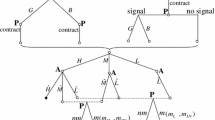Abstract
When firms want to raise external financing, why do they resort to contracts with fixed repayment, i.e., standard debt contracts? The canonical work of Gale and Hellwig (Rev Econ Stud, 52(4):647–663, 1985) gives the following answer to this question: Assuming that only the entrepreneur can observe the project’s outcome free of charge, the standard debt contract proves to be an incentive-compatible financing design. However, this approach remains inadequate, as neither the lender nor the borrower is given the possibility to act strategically. The paper at hand takes up this aspect. By means of a simple game-theoretic model and focusing on a binary outcome setting, it is shown that every risky standard debt contract is dominated by at least one ownership contract. In this respect, costly state verification cannot act as a raison d’être of contracts with fixed repayment.

Similar content being viewed by others
Notes
Occasionally, this is called a situation of “semiverifiable” results, cf. Tirole (2006), pp. 131 and 138.
Our understanding of strategic behavior coincides with the work of Dixit and Nalebuff (1991).
In reality, inspection costs may depend on the true cash flow. Yet, in the context of our model, this would not provide further insights.
Non-pecuniary penalties such as imprisonment or loss of reputation exhibit monetary equivalents to the entrepreneur, but no utility to the investor (cf. Diamond 1984, p. 396). In cases where the penalty z (partially) benefits the investor, our results continue to hold in a slightly weakened manner.
Cf. Myerson (1982).
The level of penalty exerts no influence on the agency costs. Although the fine reduces the entrepreneur’s surplus in the event that his/her misreporting has been detected, it coincides with a diminished audit probability of the investor. Comparable results have been deduced in political sciences, where the suitability of penalties for the purpose of crime prevention has been investigated, cf. Tsebelis (1990).
References
Andreoni, J., Erard, B., Feinstein, J.: Tax compliance. J. Econ. Lit. 36(2), 818–860 (1998)
Bester, H.: The role of collateral in a model of debt renegotiation. J. Money Credit. Bank 26(1), 72–86 (1994)
Bolton, P., Dewatripont, M.: Contract Theory. MIT Press, Cambridge, MA (2005)
Bolton, P., Scharfstein, D.S.: A theory of predation based on agency problems in financial contracting. Am. Econ. Rev. 80(1), 93–106 (1990)
Bolton, P., Scharfstein, D.S.: Optimal debt structure with multiple creditors. J. Polit. Econ. 104(1), 1–26 (1996)
Carlstrom, C.T., Fuerst, T.S., Paustian, M.: Optimal contracts, aggregate risk, and the financial accelerator. Am. Econ. J. Macroecon. 8(1), 119–147 (2016)
De Fiore, F., Tristani, O.: Optimal monetary policy in a model of the credit channel. Econ. J. 123(571), 906–931 (2013)
Diamond, D.W.: Financial intermediation and delegated monitoring. Rev. Econ. Stud. 51(3), 393–414 (1984)
Dixit, A.K., Nalebuff, B.J.: Thinking Strategically. W. W. Norton & Company, New York (1991)
Fudenberg, D., Tirole, J.: Game Theory. MIT Press, Cambridge, MA (1991)
Gale, D., Hellwig, M.: Incentive-compatible debt contracts: the one-period problem. Rev. Econ. Stud. 52(4), 647–663 (1985)
Grenadier, S.R., Malenko, A.: Real options signaling games with applications to corporate finance. Rev. Financ. Stud. 24(12), 3993–4036 (2011)
Hart, O., Moore, J.: Default and renegotiation: a dynamic model of debt. Q. J. Econ. 113(1), 1–42 (1998)
Innes, R.D.: Limited liability and incentive contracting with ex ante action choice. J. Econ. Theory 52(1), 45–67 (1990)
Krasa, S., Villamil, A.P.: Optimal multilateral contracts. Econ. Theory 4(2), 167–187 (1994)
Krasa, S., Villamil, A.P.: Optimal contracts when enforcement is a decision variable. Econometrica 68(1), 119–134 (2000)
Krasa, S., Sharma, T., Villamil, A.P.: Debt contracts and cooperative improvements. J. Math. Econ. 41(7), 857–874 (2005)
Krasa, S., Sharma, T., Villamil, A.P.: Bankruptcy and firm finance. Econ. Theory 36(2), 239–266 (2008)
Lu, T., Sapra, H.: Auditor conservatism and investment efficiency. Account. Rev. 84(6), 1933–1958 (2009)
Mookherjee, D., Png, I.: Optimal auditing, insurance, and redistribution. Q. J. Econ. 104(2), 399–415 (1989)
Myerson, R.B.: Optimal coordination mechanisms in generalized principal-agent problems. J. Math. Econ. 10(1), 67–81 (1982)
Neus, W., Stadler, M.: Risk and the role of collateral in debt renegotiation. Econ. Notes 42(3), 273–284 (2013)
Savani, R., von Stengel, B.: Game theory explorer: software for the applied game theorist. Comput. Manag. Sci. 12(1), 5–33 (2015)
Tirole, J.: The Theory of Corporate Finance. Princeton University Press, Princeton, NJ (2006)
Townsend, R.M.: Optimal contracts and competitive markets with costly state verification. J. Econ. Theory 21(2), 265–293 (1979)
Tsebelis, G.: Penalty has no impact on crime: a game-theoretic analysis. Ration Soc. 2(3), 255–286 (1990)
Acknowledgements
We are deeply indebted to an anonymous referee for thoughtful and constructive comments. For valuable discussions, we are grateful to Harald Kinateder and Michael Krapp.
Author information
Authors and Affiliations
Corresponding author
Rights and permissions
About this article
Cite this article
Schosser, J., Wilhelm, J. Costly state verification and truthtelling: a note on the theory of debt contracts. Econ Theory Bull 6, 129–139 (2018). https://doi.org/10.1007/s40505-018-0137-8
Received:
Accepted:
Published:
Issue Date:
DOI: https://doi.org/10.1007/s40505-018-0137-8
Keywords
- Costly state verification
- Financing contracts
- Incentive compatibility
- Perfect Bayesian Nash equilibrium




